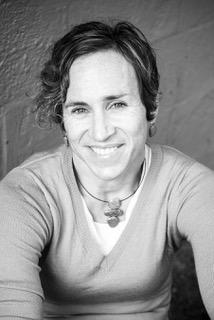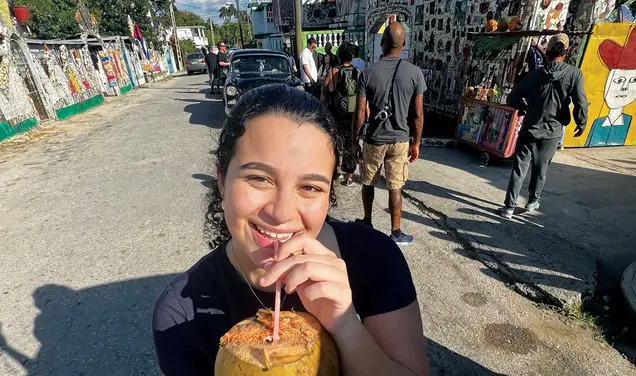The Whole Student: Making Space for More Voices
‘It is powerful when people realize they should seek help, get the care they need, and not hide in the shadows,’ said Tiffany Flik Calcutt ’95
When I started writing this PAW column about student well-being, Princetonians from different eras began reaching out to me, wondering if their stories might resonate in the Tiger universe or beyond. I’ve been interested in storytelling since my own undergraduate Princeton days as an English major who focused on autobiography. As an educator and social worker in higher education, I now believe storytelling can be a key strategy for building resilience, community, and even healing. There are many campus events and student activities organized around storytelling, and I think we should support and advocate for every mode of collecting and sharing stories, and not only about the sparkly parts of our lives.

Tiffany Calcutt ’95 told me she thought sharing her story might be helpful to someone, that as alumni we could identify ourselves not only by professional background, but in sort of “life experience buckets” like, “I have dealt with depression,” or “I had an injury.” She thought it could be impactful for students to see alumni who struggled with mental health challenges and came out the other side. When I worked at Princeton, students suggested the same. I thought they were right.
Here I share excerpts of Tiffany’s journey at Princeton and beyond. I will share more such personal narratives in the months ahead. I think we can learn a lot from each other. Current students and parents might also benefit — especially to recognize that if you are struggling, you are not alone, you aren’t the first to do so, and there is hope and help. And, both darkness and light can be contained in one person’s story.
Tiffany Calcutt ’95: A Princeton Journey
A Not Uncommon Tale
I first struggled with my mental health as a senior at Princeton, maybe mid-October. I was a politics major, co-captain of the women’s soccer team and president of my sorority. I couldn’t decide what to write my thesis on. I felt if I didn’t have a topic I was passionate about, I had nothing. I lost my appetite, my sleep suffered. I tried to operate as if everything was OK despite having no interest in the things I usually loved. My parents came to visit and saw I needed support. I don’t believe I even knew what depression was, so I didn’t talk about what was happening with teammates, or friends, or my coach.
At the time, the thought of taking a leave of absence was as daunting as the prospect of staying. I saw a therapist and started taking Prozac. Professor Jameson Doig helped me chart a path for my thesis, and I found my way to a topic. Depression wasn’t something folks talked about. Thank God that’s changed.
After Princeton
Three years later, I had another episode of depression. In graduate school, I came to the scary realization that the program I’d chosen was of very little interest and I was in the wrong place. I left Georgetown and returned home after six weeks. Again, I found a therapist and worked with a career counselor. I landed a job as a marketing manager for Major League Soccer in NYC. Life got back on track for me. I was symptom-free for years.
Married with two children, in my fifth year working in brand management for Stonyfield, I found myself once again in a gray area, not knowing what would be next, and I went into another deep depression. At a retreat at Kripalu, I met a psychiatrist who said, “There’s always hope. Always help.” She helped me realize I wasn’t getting better with the therapy I was doing. I checked in to McLean Hospital for in-patient treatment for two weeks and began electroconvulsive therapy (ECT) which I received a few more times outpatient until the depression lifted.
The past 15 years have been wonderful. I had a third child, got certified as a Spanish medical interpreter, and completed a second bachelor’s in nutrition, at age 37. I own a nutrition counseling business with an anti-diet focus, helping people have positive relationships with food and body. I’ve landed where I’m meant to be. I spent many years off antidepressants but started back in 2017 when my mom became terminally ill, knowing it would be a tough time.
Struggle to Purpose
Having had mental health struggles makes me more empathetic to my clients and friends. I can also speak clearly to my teenage daughters, to normalize that mental health struggles happen and the value of therapy. I certainly realize all the privileges I had, from family and friends who offered support to the financial resources to get top-notch care. I can’t imagine suffering as a student with family halfway around the world. It is powerful when people realize they should seek help, get the care they need, and don’t hide in the shadows. I feel honored to share this story and hope more alumni do the same, so that someone feels less alone.
Editor’s note: If you or someone you know may have suicidal thoughts, you can call the 988 Suicide and Crisis Lifeline or chat online at 988lifeline.org.











2 Responses
Cameron Stout ’80
1 Year AgoThanks for Sharing These Stories
Jess, thank you for this wonderful forum and resource for all who are seeking comfort, wellness, and understanding of mental health conditions. Tiffany, your bravery and candor are refreshing and vitally important. I graduated from Princeton in 1980. I was depressed from time to time there, managed that health condition for years as a practicing attorney, and survived a major depressive episode in 2013. I have told my story of hope and healing publicly close to 200 times. Thank you for sharing yours.
Toula (Souleles) Lechman ’91
1 Year AgoSharing To Help Others
Great piece, Jess Deutsch ’91! By sharing her touching story of struggle, Tiffany Calcutt ’95 adds to her many life accomplishments of helping others. Kudos!